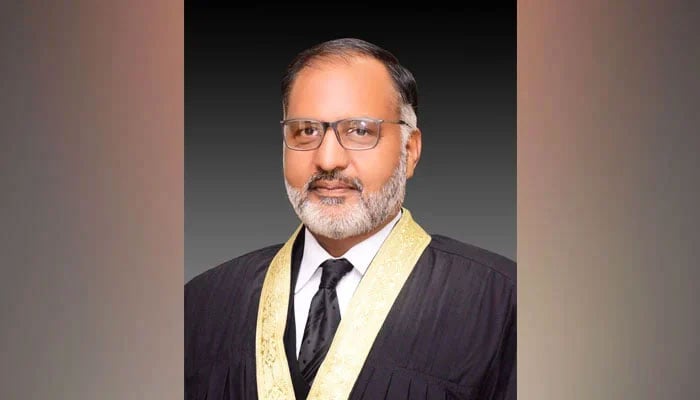From persona non grata to a trendsetter
Siddiqui said that during all these difficult years of his life, there was a sort of social boycott
ISLAMABAD: Justice (R) Shaukat Aziz Siddiqui has said that during the last five years of his sufferings, he was treated like a persona non grata by the judges of superior judiciary, including those who in their recent letter to the Chief Justice of Pakistan, are today citing his case and praising his years long struggle for the independence of judiciary.
Talking to The News, Siddiqui said that during all these difficult years of his life, there was a sort of social boycott that he was facing from his brother judges in Islamabad High Court. “They even did not attend the wedding of my daughter despite having been invited,” said Siddiqi.
He said that Justice Gul Hassan Aurangzeb was the only exception who used to exchange greetings with him on Eids. Besides others, he said, four of the six judges who wrote letter to the CJP a few days back were also invited to the wedding of his daughter but none of them had turned up.
After the SC’s recent decision that vindicated Justice (R) Siddiqi’s position, one of these judges, however, visited Siddiqui to congratulate him.
Siddiqui reminded that following his July 2018 address to the Rawalpindi Bar Association that led to his dismissal from service, recently declared illegal and unconstitutional by the Supreme Court, not even a single judge spoke in his favour during all these years. Interestingly, Shaukat Siddiqui’s case has been the focus of the six judges’ letter on the basis of which they talked about the alleged incidents of coercion and intimidation that they claimed to have been facing.
Recalling how Siddiqui was removed, the IHC judges said, “While the declaration issued by the SC has vindicated Justice Siddiqui to an extent, his unceremonial removal from office can understandably not be compensated many years after his removal.”
These judges, while supporting Justice Siddiqui’s demand to investigate the allegations made by him against the then DG(C) of ISI Gen Faiz Hameed, requested the CJP that the scope of such allegations be expanded to determine whether such interference in relation to the administrative functions of IHC and judicial proceedings of the courts that IHC supervise are still continuing.
The judges in their letter referred to several incidents of alleged threats and coercion from intelligence agencies. They particularly named ISI several times and said, “We believe that individual judges must not be required to be as brave as Justice Qazi Faez Isa, the Chief Justice of Pakistan, to fight persecution at the hands of the executive on their own, or as resolute as Justice Siddiqui, to continue to fight a wrong for personal vindication long after removal from office. Independence of the judiciary is a salient feature of the Constitution meant to uphold fundamental rights and dispense justice in accordance with law in public interest, there is a need for an institutional response to uphold and protect independence of the judiciary.”
Siddiqui laments that when he spoke against the ISI’s interference to protect independence of judiciary, he was left alone by the entire judiciary, including his brother judges and treated him like a persona non grata.
-
 Epstein Case: Ghislaine Maxwell Invokes Fifth, Refuses To Testify Before US Congress
Epstein Case: Ghislaine Maxwell Invokes Fifth, Refuses To Testify Before US Congress -
 Ferrari Luce: First Electric Sports Car Unveiled With Enzo V12 Revival
Ferrari Luce: First Electric Sports Car Unveiled With Enzo V12 Revival -
 Chappell Roan Parts Ways With Wasserman Music Over CEO's Ties With Epstein
Chappell Roan Parts Ways With Wasserman Music Over CEO's Ties With Epstein -
 Andrew Mountbatten Windsor Publically Shamed After Brother And Nephew Change Decades Old Royal Rule
Andrew Mountbatten Windsor Publically Shamed After Brother And Nephew Change Decades Old Royal Rule -
 Jon Stewart On Bad Bunny's Super Bowl Performance: 'Killed It''
Jon Stewart On Bad Bunny's Super Bowl Performance: 'Killed It'' -
 Savannah Guthrie Receives Massive Support From Reese Witherspoon, Jennifer Garner After Desperate Plea
Savannah Guthrie Receives Massive Support From Reese Witherspoon, Jennifer Garner After Desperate Plea -
 Celebrities Take Sides As Brooklyn Beckham’s Feud With David, Victoria Heats Up
Celebrities Take Sides As Brooklyn Beckham’s Feud With David, Victoria Heats Up -
 Prince Harry Reacts As Beatrice, Eugenie's Names Surface In Epstein Emails
Prince Harry Reacts As Beatrice, Eugenie's Names Surface In Epstein Emails -
 Cyprus Joins European AI Race: What It Means For Greek LLMs And Regional Innovation
Cyprus Joins European AI Race: What It Means For Greek LLMs And Regional Innovation -
 Amazon Soon To Launch 'AI Content' Marketplace, Says Report
Amazon Soon To Launch 'AI Content' Marketplace, Says Report -
 Is AI Reliable For Health Advice? New Study Raises Red Flags
Is AI Reliable For Health Advice? New Study Raises Red Flags -
 WhatsApp Web Starts Rolling Out Voice And Video Calling For Beta Users
WhatsApp Web Starts Rolling Out Voice And Video Calling For Beta Users -
 Catherine O’Hara’s Cause Of Death Finally Revealed
Catherine O’Hara’s Cause Of Death Finally Revealed -
 Swimmers Gather At Argentina’s Mar Chiquita For World Record Attempt
Swimmers Gather At Argentina’s Mar Chiquita For World Record Attempt -
 Brooklyn Beckham, Nicola New Move Could Leave David, Victoria Reeling
Brooklyn Beckham, Nicola New Move Could Leave David, Victoria Reeling -
 Anthropic Criticises ChatGPT Ads As OpenAI Begins Testing Advertising In AI Chats
Anthropic Criticises ChatGPT Ads As OpenAI Begins Testing Advertising In AI Chats




